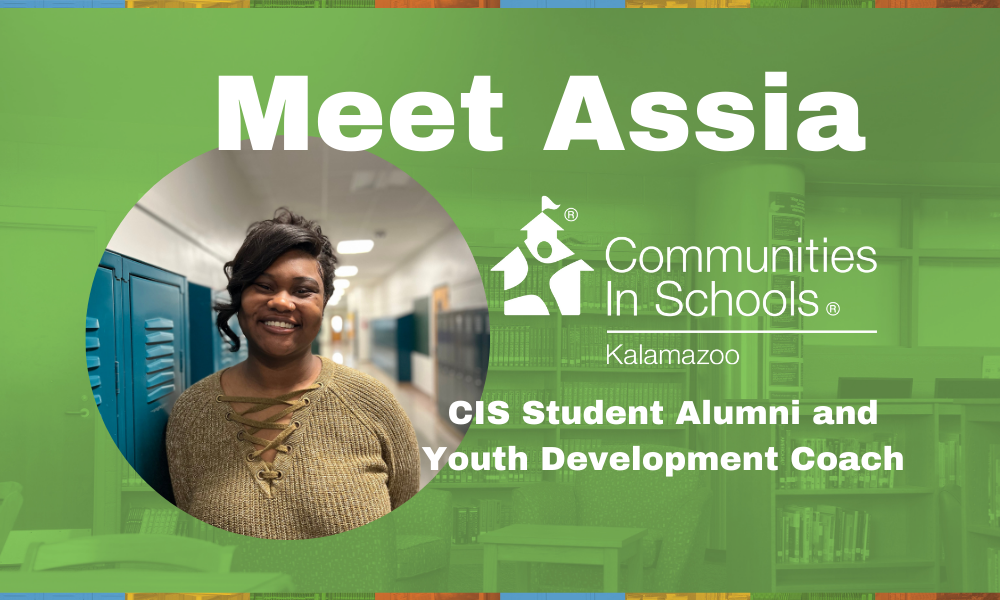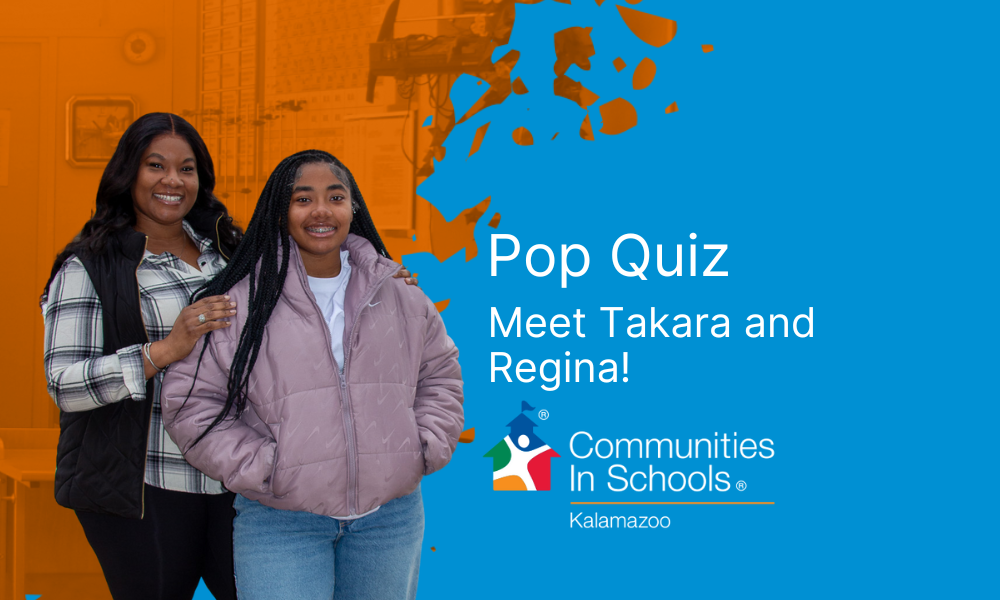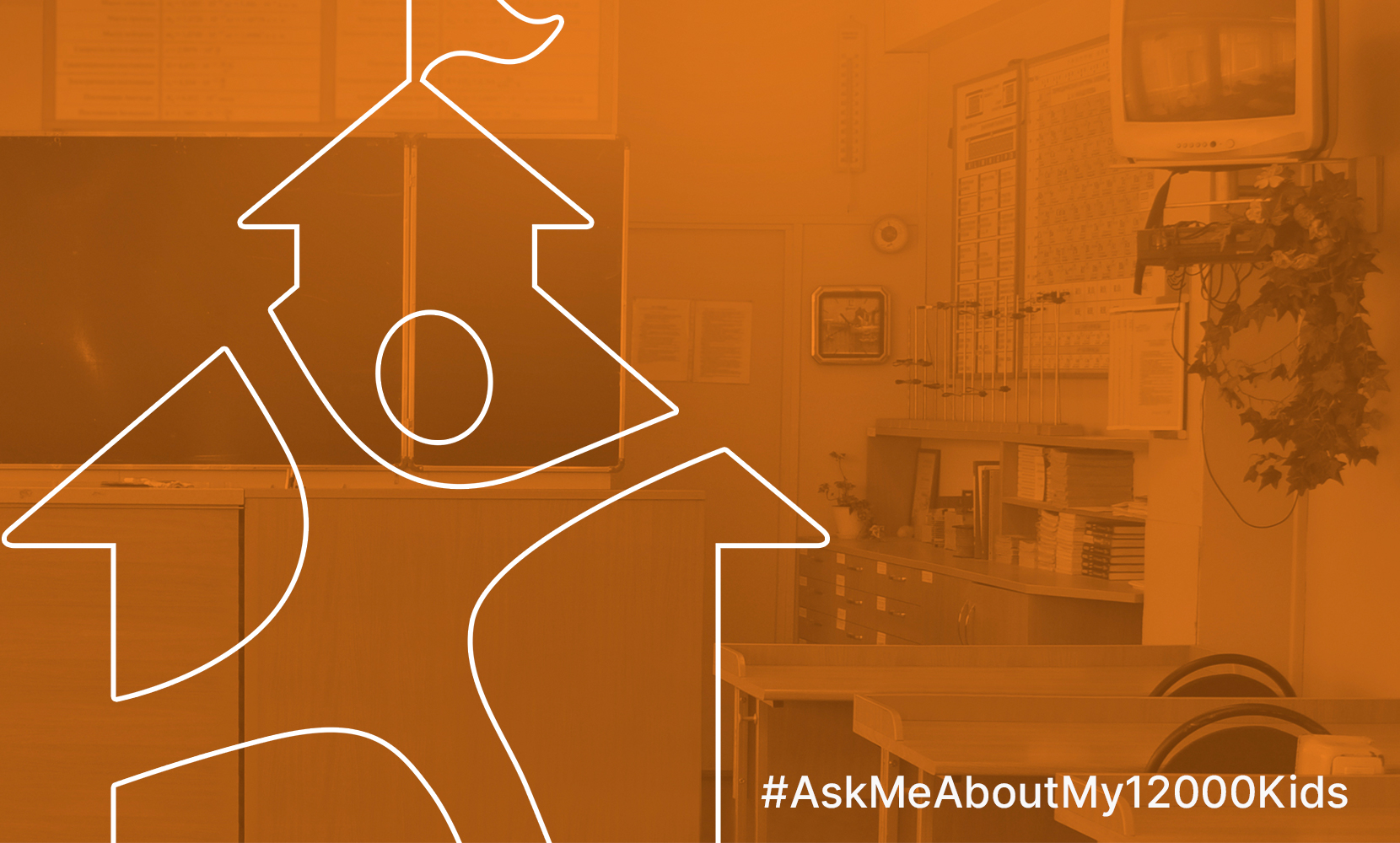Connecting community in ways that matter for our children is Artrella’s sweet spot.
Welcome back to the POP QUIZ! This is a regular, yet totally unexpected, feature where we ask students, parents, staff, our friends, and partners to answer a few questions about what they are learning, reading, and thinking about. Today we feature Artrella Cohn. For regular readers of this blog, her name is probably familiar to you as Ask Me About My 12,000 Kids has tapped Artrella countless times for her insights on numerous topics. But, until now, Ask Me About My 12,000 Kids hasn’t sat down with her for a one-on-one pop quiz!
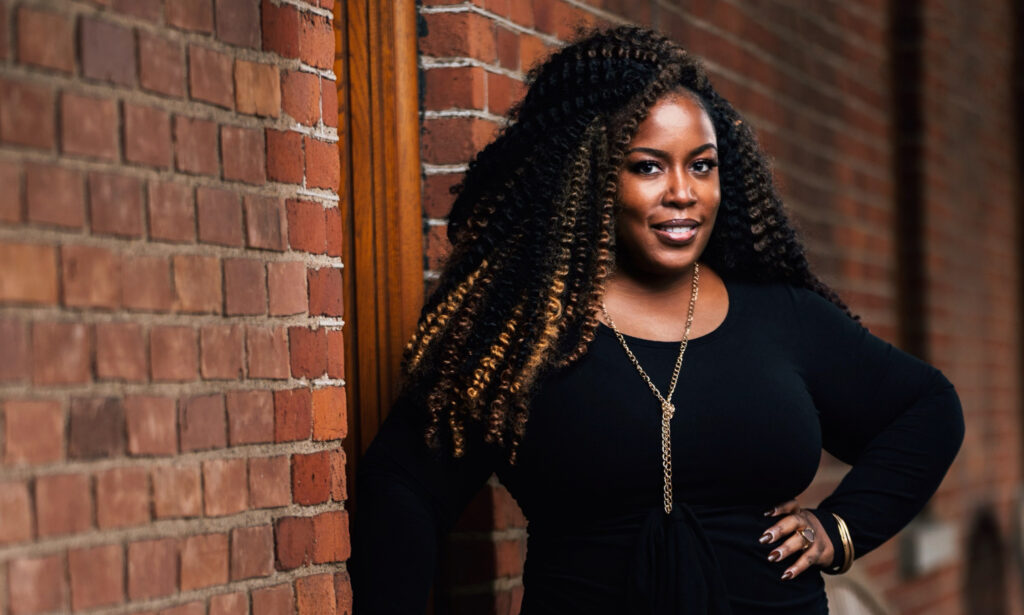
As Senior Director of Community Engagement and Student Investment at Communities In Schools of Kalamazoo, Artrella works hard and under the radar to get things done both in our schools and in this community. And because of this, Artrella was recently honored at the 16th annual Champs Celebration with the 2023 CIS Staff Recognition. [You can watch a video clip of portions of this event here, including some of what Executive Director James Devers said of this “quiet warrior” at around the 6:10 mark.]
A life-long resident of Kalamazoo and graduate of Kalamazoo Public Schools and Western Michigan University, Artrella has a strong commitment to educational equity and quality youth development. In addition to her work with CIS, she also serves on several local committees and boards including the Kalamazoo Community Foundation, United Way Community Impact Committee, YWCA Kalamazoo, Community Advocates for Parents and Students, and others. She has served on the Kalamazoo Community Foundation’s Anti-Racism Transformation Team (ARTT) since its inception in 2018, as well as the KZCF Community Investment Committee.
Alright, Artrella: pencil out, eyes on your own paper. Good luck.
Pop Quiz
You have quite a history with Communities In Schools of Kalamazoo and have held various roles within the organization. Back in 2003, while working on your undergraduate degree in social work from Western Michigan University, you served as a CIS intern at Milwood Elementary School. You then went on to pursue your Masters in Social Work from the University of Michigan. In the fall of 2009, you returned to CIS and served as CIS Site Coordinator at Kalamazoo Central High School. A year and a half later, you became Director of Secondary Sites. In 2016, you stepped into your current role as senior director of community engagement and student investment. Why CIS?
The bottom line for me is that when I went for my master’s degree, I had a pretty clear vision of what I wanted to do. I knew I wanted to impact change for young people so that they had a better trajectory on their lives because somebody did that for me. But I also wanted to be in a decision-making position. This organization has allowed me to develop the necessary skills I needed at the interpersonal level while serving as a site coordinator, working in the afterschool program, and being an intern.
CIS has also given me the opportunity to advance into more and more of a leadership role, and that has made sense for me as a young professional. We all need to do interpersonal work, I think. If you’re in social work, you need to do interpersonal work, that’s the people level, where the heart connects you to the purpose. And so when I became director of secondary sites, it gave me an understanding and appreciation for how to manage people who do that level of work. It was a challenging position for me because I don’t do a whole lot of peopling. It’s not natural for me, but I’ll do it. So having the responsibility of managing people who are managing people who are managing people, that’s a lot of people that you are responsible for to help develop and guide, while at the same time, making sure they are representing Communities In Schools in a way that is meant to serve us and our students.
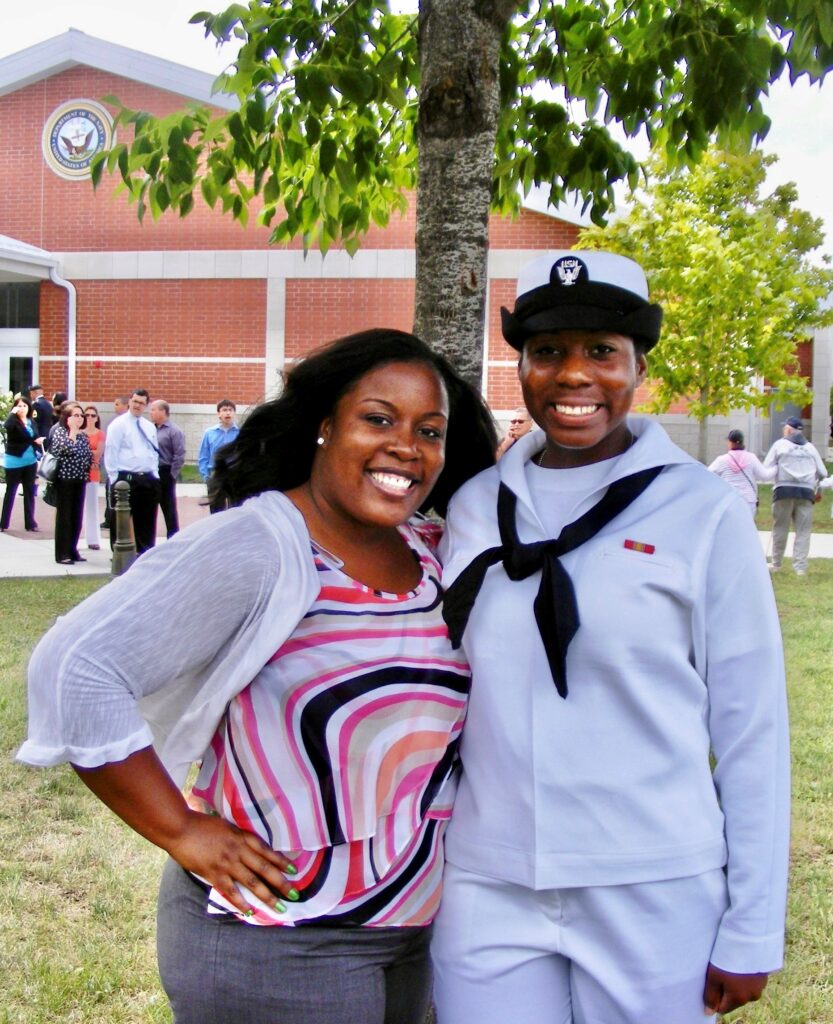
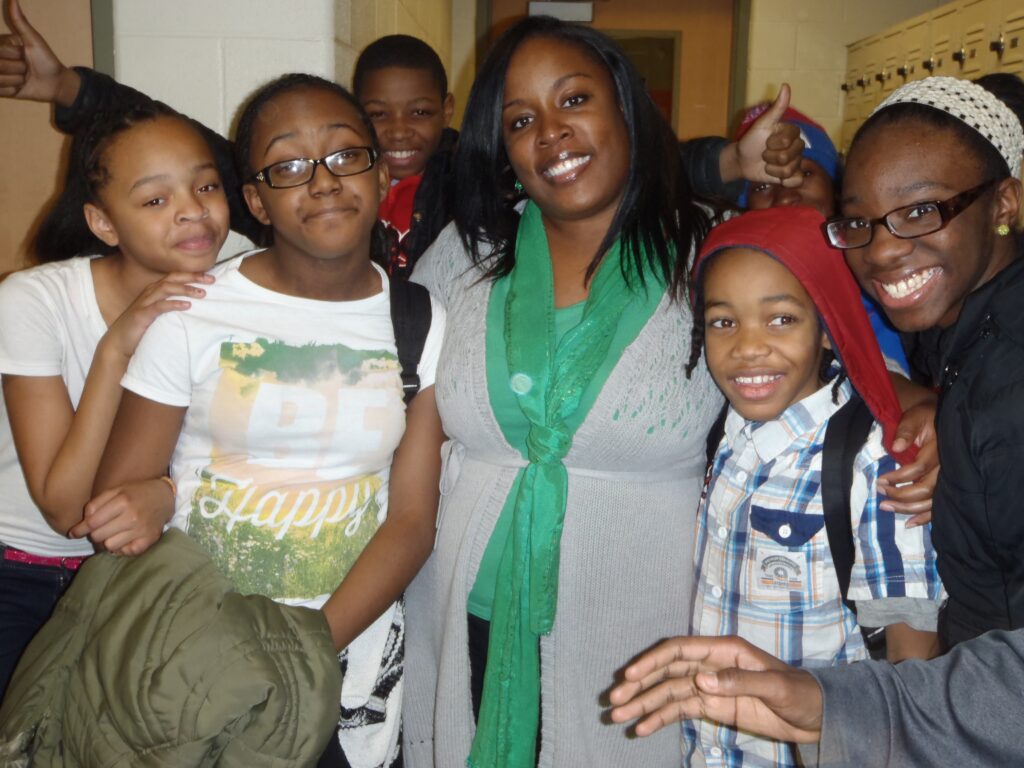
The transition from that position of managing people to this position, well, I was ready. This position is more community-centered. When working on my master’s degree, I focused on community organizing. Some people choose a clinical focus or policy planning and administration. I chose community organizing. So this is my sweet spot—being in a position where the primary focus of my role is to connect with community around how they might help to benefit the students we serve, and to also reciprocate and say, Hey, we’re experts in a lot of ways. How can we assist you so you can serve students as best you can? I’ve found my sweet spot, and it is this position I’m now in! That’s why I’ve been here so long.
Why is community so important to you?
There is a slogan that says, Nothing about us without us. Essentially, what it means is that just because I have an education, because I went to college and got a degree, that doesn’t mean I should make decisions void of the people for whom those decisions are going to impact.
I feel that, in a lot of ways, politicians and other leaders are in those decision-making seats. I’m not saying they’re doing anything wrong to harm anybody, but some of them are, right? For me, community organizing is that sweet spot where I have an opportunity to help impact decisions utilizing the voices and lived experiences of those who will be impacted by those decisions.
I’m not blindly saying we need to do this and we need to change that or we need this policy. I’m saying, What are the challenges for you, the people who live in this community. How will this policy impact you?
For CIS, it’s What do you need? I can guess. I can think about my childhood and what I needed but that was 20 some years ago. So what do your kids need now, in 2023? What’s the biggest challenge for you as a parent navigating the school environment? And then bringing that back to the leadership team that I sit on and sharing what parents, families, and kids are saying they need. Or better yet, whenever possible, inviting them to speak for themselves.
… Inclusion means the voices of the people, not just bringing together a bunch of bodies but bringing in the thought leaders. The people who live in the communities we serve, they are the thought experts. They know what they need. As a person doing community organizing, I can sit with them and they aren’t intimidated by me because I’m not walking in there and telling them that, this, and the other. I’m walking in and saying, Look, I need you. You might think you need me, but actually, I need you. Because until you tell me what you need, everything that I suggest is going to fail.
There is a beauty to being in community with people and saying, I just want to hear from you. I don’t have an agenda other than to listen and for you to be heard. Because I have to go back and start making decisions that are going to impact you. And that doesn’t sit right with me if I do that blindly or without your voice.
So what’s a hobby or interest our readers might not know you have?
I have quite a few interests. I love to read. I founded a book club, The Lovely Ladies of Literature. We celebrated ten years this past January. I also love photography and have a business, A. Cohn Photography, where I do headshots, family portraits, events, and more.
Oh, and hair. I love hair! I do my own hair and love mixing it up. I also love to paint on canvas with acrylic. And I’m most obsessed with music. I have 400 vinyls, mostly soul and R&B music.
You are definitely a renaissance woman! You are talented and knowledgeable in a number of areas. Where does that interest to pursue your many passions comes from?
Hmm. I’ve always been quiet and introspective. I don’t do unnecessary talking, even as a little kid, I wasn’t the social person. I’m introverted and people don’t believe that about me because they see me “on” and in the community. But that’s my work, my mission. That’s my calling. I need to do those things … But when I get home, I need about a week to recuperate.
If I wasn’t so driven to see change in my community, I’d stay home all day and paint and listen to music and do my hair! But I can’t do that. So I think part of it is that I sit with myself and my thoughts a lot. And I’ll observe somebody or something and I’ll wonder, How did they do that? And then I’ll try that and soon enough, I’m painting, making jewelry, shooting photos. I’ve found that when you observe and listen and don’t always have your mouth moving, you can explore more in the world and see what might be of interest to you.

What are you currently reading?
My book club is reading The Exes by Brandon Massey this month. I finished it within a few days. It was quite suspenseful. We met Brandon at the National Book Club Conference in Atlanta some years ago and I fell in love with his writing. I am currently casually reading two other books, Girls that Invest by Simran Kaur and The Black Girl’s Guide to Financial Freedom by Paris Woods.
What is your favorite word or phrase right now?
“I’m differently motivated.” When I turned 40, a light clicked on, There are people in my life who are in the 30 to 40ish age range and are doing all these different things. It’s awesome. They’re living their moments. In watching them, I can just tell that part of their motivation for choosing this particular route is completely differently than what I would ever care about. For example, money is so important to my generation. I get it. I grew up working poor. But I’m not motivated by money. Sure, I want to make enough money to pay my bills and be comfortable, but if it requires I stay up all hours to make that money, I’m not choosing that route. I’m choosing rest and self-care. I’m choosing to live. That may be living to them, but to me it’s a grind. I’m not a machine. I don’t want to grind. I want to live.
In the pandemic, I lost quite a few close people in my life. It taught me that I’m not going to be here forever. So all this hard work, sweat, and tears, I’m not going to work myself into a permanent hole …
At the same time, I don’t feel good when I’m well but my community is not doing well. That doesn’t work for me. So if there is something I can do, whatever that may be, I’m going to do it.
Usually, we ask who one of the caring adults in your life has been. But back in 2016, Ask Me About My 12,000 Kids actually published a letter you wrote to one of your caring adults, Mrs. Benton. [You can read the letter here.]?
Yes. And you can’t forget Ms. Dorothy Young! She was and may forever be my only professional mentor. Her impact on my life has been unmatched. [This post celebrates the legacy of the Late Dorothy P. Young.]
Let’s talk a little now about diversity, equity, and inclusion (DEI). Ever since we’ve known you, even in your role as a CIS intern, you’ve been a champion of bending that arc toward justice ever forward. In your leadership role with CIS, you were selected by National CIS to help with the planning and implementation of DEI work throughout the network. As part of that core team, and serving on the DEI subteam for organizational health, you help set the tone for others by championing inclusion, belonging, and equity on a daily basis. It is such an integral part of your personal and professional life. How do you personally live that out and get others to live and breathe this work as well?
It’s interesting, I didn’t start engaging in this work when DEI became a “thing.” It helps that I have a social work degree because that’s part of the social work education, understanding diversity and equity, and how people need different things and have different needs at different points of their lives, and how racism can impact that. That was part of my educational journey.
Also, as a young Black girl growing up in Kalamazoo in zip codes that are predominately low income and carried all the stereotypes and labels that go along with that, and because I was an introverted young person who thought and watched a lot, I can’t remember when I didn’t think about racism—not necessarily articulate it. But, I’d watch and think about what I was noticing. Mmmm, that don’t seem right that my friend in my class got suspended for three days for the same thing little Tommy did five times without the teacher saying a word to him. I would realize it, but I wouldn’t know how to speak about it.
As time went on, I gained credible knowledge, so reading and researching, talking to elders about the times I wouldn’t have been able to sit in the same classroom with Tommy in the first place, talking with my grandmother who grew up in Memphis, Tennessee and went through civil rights, and just listening and observing. I enjoy learning, so when the internet was a thing, I’d type key words like “racism” and “Jim Crow” … And now, we’re in a season in this nation where there are opportunities to have intentional dialogue with like-minded people about this work and how we can intentionally work together to eradicate, uproot, and disturb those types of systemic changes in this nation.
When it comes to diversity, equity, and inclusion, how do you think we are doing? Both community-wise, and CIS-wise?
Whoah! Wow. Okay. I’ll start with our community. So much good stuff has been going on. A lot of amazing things are happening. A lot of people in this community are not okay with what’s happening in this country, particularly when it comes to racism and lack of justice for all. People are really coming together around those issues. It might show up as gun violence awareness and in other ways. A lot of beautiful things are happening.
However, because of the power dynamics and the power structures that be, it’s challenging.
We need the right people in office, be it in Kalamazoo, in Michigan or throughout the country … With the swipe of a pen or a vote, those in power can undo the work we’re doing. It’s frustrating. At the same time, I’m seeing people in committees and in our community fighting for rights, and I love that. A great deal of community activism is going on and what I love about that is that it centers authentic connections and relationships. Void of these relationships, the members of the community are not likely to respond to or buy into the sought after change.
People have to get out and vote, and educate themselves on who the candidates are, and not just do it a few days before voting. Dig into their lives a bit and see what they’ve been doing for the past 10, 15, or 20 years. And then decide whether you want that person to speak for you. Vote, but not blindly.
As for CIS, I think CIS has done phenomenal things with regards to race equity and how we look at our services, how we operate with who we are serving and what they need, who our staff are and how are staff are being taken care of in this climate of financial struggle for a lot of people.
We have done a lot of educating, there’s been a lot of opportunities to be in community with each other to discuss DEI-type topics and have content experts come in. I appreciate that because sometimes people might be thinking things but don’t have an outlet or community to share. So they hold it in and nothing happens. So CIS has created a lot of opportunities such as offering “lunch and learn” opportunities for staff, [Executive Director] James [Devers] working together with the board on these issues, and that’s monumental. We’ve had book discussions around race equity and youth, particularly youth dealing with racism and how that impacts them. Staff across our whole team—from leadership to direct staff working after school with kids—everyone has had opportunities to participate. There has been a lot of work done to build community around equity in this organization. We still have more to learn and the work must continue and deepen.
Thriving in a diverse work environment is easier said than done. Research suggests that working on diverse teams produces stronger outcomes because the diversity of perspectives can actually make the process harder. It requires teamwork and effort to create connections and understanding across differences that will result in positive outcomes for kids. What tips do you have for how we can better understand the perspectives of our colleagues, partners, and others from different backgrounds?
The main tip I would stress is that as much as you put into working on a team, you need triple that and work on yourself. A lot of times, we don’t do that, especially when we arrive at a certain educational status, we think, Okay, I got my Masters, I got my Ph.D., I got this figured out. Yet, there are biases that we all come to work with, or go home with, or go out into the community with, that, without us even thinking about it are having some type of impact. Because, we usually don’t sit back and think, Hmm. Am I being biased? We don’t talk about. We just do it. And then it negatively impacts how we come together as a team. We all have different biases and your particular bias could be triggering for someone else. So we have to do a lot of self-work. Self-work in this area is always needed.
And I think that’s the reason this nation is so jacked-up. Everything is a separate community. The Christian community, the LGBT community, the Black community, the whatever community. Of course I value being a part of communities that are similar, but at the end of the day, I have my own brain and my own heart. I can go into a space with a bunch of women—I’m definitely a woman—and be like, They don’t get me! Just like I can go into a space with a whole bunch of Black people and think, I gotta get out of here because they aren’t representing me. So we have to stop assuming that because we are “x” identity, that the community of that identity is going to be representative of who we are as an individual. And a lot of times, we go with those assumptions because we haven’t taken the time to figure out and ask, Who am I really?
So now I walk into a space and a team member says something and it triggers me. Instead of me stopping before I respond and think, Why does that trigger me? Why am I bothered by that? Because this is someone I love and respect. I love my team, but this thing they just said really bothers me, so now I want to spazz and say something crazy. Why?
But we don’t always do that. Instead, I say something back real fast. That individual work we need to do is part of the issue. We have to give ourselves permission to pause and question ourselves. So that’s my main tip. Check yourself—always. Check in on yourself. Take care of yourself. And when you find yourself triggered by something, ask yourself why. Ninety-nine percent of the time there’s an answer for it, and you know it already. And when you answer yourself in your head, you’re going to respond differently. Now I’m probably going to say, This is my experience and let me explain how I see it instead of, That’s ain’t right! And now we can dialogue because we’re hearing each other, whereas before, I was just responding.
When it comes to DEI work, President and CEO of CIS National Rey Saldaña said, “The evidence, the history, the research, all tells us what we need to do. The question is whether we have the courage to rebuild the system of public education in a way that is just and equitable for all students.” So bottom-line, do you believe this community has the courage to really tackle this work?
Pockets of the community, absolutely yes! But there are some pockets, and mostly those that have lots of power, that don’t. Not for lack of courage, but because they don’t see the need for it. They’re very comfortable. Where they are, it does not impact them the same way it does others, like the ones who are on fire, who say, We don’t just need to rebuild, we need to uproot. We literally need to find the beginning of the root, find where the root starts—which could literally take forever because some of these roots are so deep—but we have to be willing to do that work because on nobody’s earth are we okay with any of that root sprouting back up and regrowing.
Thank you, Artrella, for hanging out with us at Ask Me About My 12,000 Kids.
Tags: Artrella Cohn, CIS, Communities In Schools of Kalamazoo, DEI, Western Michigan University


